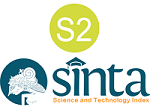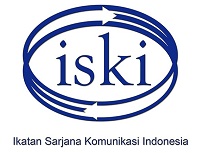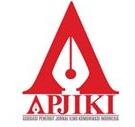Multi Case Analysis on The Development of Fact-Checking Organizations in Indonesia
Abstract
Full Text:
PDFReferences
AJI Indonesia. (2021). Webinar #4: Di balik dapur pemeriksaan fakta. Youtube.Com. https://www.youtube.com/watch?v=-KaHPR3cYQU&t=589s&ab_channel=AJIIndonesia
Amazeen, M. A. (2015). Revisiting the epistemology of fact-checking. Critical Review, 27(1), 1–22. https://doi.org/10.1080/08913811.2014.993890
Amazeen, M. A. (2020). Journalistic interventions: The structural factors affecting the global emergence of fact-checking. Journalism, 21(1), 95–111. https://doi.org/10.1177/1464884917730217
Arnold, P. (2017). Statistical literacy in public debate - Examples from the UK 2015 general election. Statistics Education Research Journal, 16(1), 217–227.
Astuti, S. I. (2017). Konstruksi body of knowledge tentang hoax di indonesia: upaya merumuskan landasan strategi anti-hoax. In R. Darmastuti, S. W. M. Edi, & D. K. Sari (Eds.), Kolase Komunikasi di Indonesia (Issue April, pp. 283–308). Buku Litera. http://repository.uksw.edu/bitstream/123456789/13387/17/BOOK_Santi Indra A_Konstruksi Body of Knowledge.pdf
Bell, E. (2019). The fact-check industry: Has our investment in debunking worked? Columbia Journalism Review. https://www.cjr.org/special_report/fact-check-industry-twitter.php
Ceci, S. J., & Williams, W. M. (2020). The psychology of fact-checking. Scientific American. https://www.scientificamerican.com/article/the-psychology-of-fact-checking1/
Fridkin, K., Kenney, P. J., & Wintersieck, A. (2015). Liar, liar, pants on fire: how fact-checking influences citizens’ reactions to negative advertising. Political Communication, 32(1), 127–151. https://doi.org/10.1080/10584609.2014.914613
Graves, L. (2016). Deciding what’s true: the rise of political fact-checking in American Journalism. America: Columbia University Press.
Graves, L. (2017). Anatomy of a fact check: objective practice and the contested epistemology of fact checking. Communication, Culture and Critique, 10(3), 518–537. https://doi.org/10.1111/cccr.12163
Graves, L., & Cherubini, F. (2016). The rise of fact checking sites in europe. Reuters Institute for the Study of Journalism. https://reutersinstitute.politics.ox.ac.uk/sites/default/files/research/files/The%2520Rise%2520of%2520Fact-Checking%2520Sites%2520in%2520Europe.pdf
Haigh, M., Haigh, T., & Kozak, N. I. (2017). Stopping fake news: The work practices of peer-to-peer counter propaganda. Journalism Studies, 1–26. https://doi.org/10.1080/1461670X.2017.1316681
Hartley, J. F. (2004). Case studies in organizational research. In C. Cassell & G. Symon (Eds.), Qualitative methods in organizational research: A practical guide (pp. 323–333). SAGE.
Hidayatullah, A. (2019). Suara.com Resmi masuk daftar media internasional cek fakta terverifikasi. Suara.Com. https://www.suara.com/news/2019/10/29/045916/suaracom-resmi-masuk-daftar-media-internasional-cek-fakta-terverifikasi
Kaur, K., Nair, S. S., Kwok, Y., Kajimoto, M., Chua, Y. T., Labiste, M. D., Soon, C., Jo, H., Lin, L., & Thanh, L. T. (2018). Information disorder in Asia. In M. Kajimoto & S. Stanley (Eds.), Information Disorder in Asia: Overview of misinformation ecosystem in India, Indonesia, Japan, the Philippines, Singapore, South Korea, Taiwan, and Vietnam. The University of Hong Kong.
Khaldarova, I., & Pantti, M. (2016). Fake News: The narrative battle over the Ukrainian conflict. Journalism Practice, 10(7), 891–901. https://doi.org/10.1080/17512786.2016.1163237
Kliwantoro, D. D. (2020). Lawan hoaks COVID-19, Japelidi kampanye dalam 42 bahasa daerah. Antaranews. https://www.antaranews.com/berita/1381214/lawan-hoaks-covid-19-japelidi-kampanye-dalam-42-bahasa-daerah
Kompas.com. (n.d.). Fact-checker Kompas.com. Kompas.Com. https://cekfakta.kompas.com/about#metodologi
Lim, C. (2018). Checking how fact-checkers check. Research and Politics, 5(3), 1–7. https://doi.org/10.1177/2053168018786848
Liputan6.com. (n.d.). Metode cek fakta. Liputan6.Com. Retrieved November 20, 2018, from https://www.liputan6.com/info/metode-cek-fakta
Mantzarlis, A. (2016). There’s been an explosion of international fact-checkers, but they face big challenges. Poynter. https://www.poynter.org/fact-checking/2016/theres-been-an-explosion-of-international-fact-checkers-but-they-face-big-challenges/
Mantzarlis, A. (2018). Fact-checking 101. UNESCO. https://en.unesco.org/sites/default/files/module_5.pdf
Maryani, E., Rahmawan, D., & Karlinah, S. (2020). The implications of social media on local media business: Case studies in Palembang, Manado and Bandung. Jurnal Komunikasi: Malaysian Journal of Communication, 36(1), 317–333. https://doi.org/10.17576/JKMJC-2020-3601-18
Matanasi, P. (2017). Bondan Winarno, Legenda Wartawan Investigasi. Tirto.Id. https://tirto.id/bondan-winarno-legenda-wartawan-investigasi-cATy
Meyer, C. B. (2001). A case in case study methodology. Field Methods, 13(4), 329–352. https://doi.org/10.1177/1525822X0101300402
Moore, M. (2018). Democracy hacked: political turmoil and information warfare in the digital age. Oneworld Publications Ltd.
Muliya, D. (2020). Menkominfo temukan 47 isu hoax dalam pilkada 2020, polisi tindaklanjuti pelanggaran tindak pidananya. Kompas TV. https://www.kompas.tv/article/129659/menkominfo-temukan-47-isu-hoax-dalam-pilkada-2020-polisi-tindaklanjuti-pelanggaran-tindak-pidananya?page=all
Nieminen, S., & Rapeli, L. (2018). Fighting misperceptions and doubting journalists’ objectivity: a review of fact-checking literature. Political Studies Review, 1–14. https://doi.org/10.1177/1478929918786852
Nurlatifah, M., & Irwansyah, I. (2019). Fact-Checking journalism sebagai platform kolaborasi human and machine pada jurnalisme digital. Jurnal Komunikasi, 13(2), 121–134. https://doi.org/10.20885/komunikasi.vol13.iss2.art1
Nyhan, B., & Reifler, J. (2015). The effect of fact-checking on elites: a field experiment on us state legislators. American Journal of Political Science, 59(3), 628–640. https://doi.org/10.1111/ajps.12162
Oxtora, R. (2019). AMSI dan AJI periksa fakta pemilu dibantu google dan mafindo. Antaranews. https://www.antaranews.com/berita/834383/amsi-dan-aji-periksa-fakta-pemilu-dibantu-google-dan-mafindo
Porter, E., & Wood, T. J. (2021). The global effectiveness of fact-checking: Evidence from simultaneous experiments in Argentina, Nigeria, South Africa, and the United Kingdom. Proceedings of the National Academy of Sciences of the United States of America, 118(37), 1–7. https://doi.org/10.1073/pnas.2104235118
Portnoy, M. (2018). Rangking 10 besar media online indonesia by comescore. Teknorush. https://teknorush.com/news/media-online-indonesia/
Rahma, A. (2019). AJI gelar pelatihan fact checker kepada 3000 jurnalis. Tempo.Co. https://nasional.tempo.co/read/1195688/aji-gelar-pelatihan-fact-checker-kepada-3000-jurnalis/full&view=ok
Sasmito, A. (2020). Tular nalar, bukan sekadar paham – teaser. Mafindo.or.Id. https://www.mafindo.or.id/2020/12/23/tular-nalar-bukan-sekadar-paham-teaser/
Silverman, C. (2015). Lies, damn lies, and viral content: how news websites spread (and debunk) online rumors, unverified claims, and misinformation. https://towcenter.org/research/lies-damn-lies-and-viral-content/
Stake, R. E. (2006). Multiple case study analysis. The Guilford Press.
Stencel, M., & Griffin, R. (2018). Fact-checking triples over four years. Reporters Lab. https://reporterslab.org/fact-checking-triples-over-four-years/
Suara.com. (n.d.). Tentang cek fakta. Suara.Com. Retrieved September 7, 2019, from https://www.suara.com/pages/tentangcekfakta
Tantuco, V., & Tuquero, L. (2020). Fact-checking the falsehoods that came out of 2020. Rappler.Com. https://www.rappler.com/newsbreak/iq/fact-checking-falsehoods-came-out-year-end-2020
Tapsell, R. (2018). Disinformation and democracy in Indonesia. New Mandala. https://www.newmandala.org/disinformation-democracy-indonesia
Tempo.co. (n.d.). Bagaimana kami bekerja. Tempo.Co. Retrieved November 20, 2018, from https://cekfakta.tempo.co/metodologi
The Poynter Institute. (n.d.). Verified signatories of the IFCN code of principles. IFCN Code of Principles. Retrieved December 3, 2019, from https://ifcncodeofprinciples.poynter.org/signatories
The Poynter Institute. (2020). Fighting the infodemic: The #CoronaVirusFacts Alliance. Poynter. https://www.poynter.org/coronavirusfactsalliance/
Thorn, M., & Curnow, S. (2021). “What you share defines you”: Indonesia has world’s biggest fact-checking Network. Jakarta Globe. https://jakartaglobe.id/news/what-you-share-defines-you-indonesia-has-worlds-biggest-factchecking-network
Tirto.id. (2016). Tentang kami: jernih, mengalir, mencerahkan bersama tirto.id. https://tirto.id/insider/tentang-kami
Tirto.id. (2017). Metodologi Pemeriksaan fakta dan riset mandiri. https://tirto.id/insider/metodologiriset
Tompkins, A. (2020). Is fact-checking effective? A critical review of what works – and what doesn’t. Dw.Com. https://www.dw.com/en/is-fact-checking-effective-a-critical-review-of-what-works-and-what-doesnt/a-55248257
Tomsa, D., & Setijadi, C. (2018). New forms of political activism in Indonesia. Asian Survey, 58(3), 557–581. https://doi.org/10.1525/AS.2018.58.3.557
Tyson, A., & Purnomo, B. (2016). President Jokowi and the 2014 obor rakyat controversy in Indonesia. Critical Asian Studies, 49(1), 117–136. https://doi.org/10.1080/14672715.2016.1258585
Verdiana, B. M. T. (2020). Liputan6.com raih coronavirus fact-checking grant dari IFCN dan Facebook. Liputan6.Com. https://www.liputan6.com/global/read/4243344/liputan6com-raih-coronavirus-fact-checking-grant-dari-ifcn-dan-facebook?utm_source=lpfeed&utm_medium=lpfeed&utm_campaign=3874769
Wardle, C. (2017). Fake news. It’s complicated. first draft. https://firstdraftnews.org/fake-news-complicated/
Wardle, C., Pimenta, A., Conter, G., Dias, N., & Burgos, P. (2019). Comprova: an evaluation of the impact of a collaborative journalism project on brazilian journalists and audiences. FIRSTDRAFT. https://firstdraftnews.org/comprova-an-evaluation-of-the-impact-of-a-collaborative-journalism-project-on-brazilian-journalists-and-audiences/
Winarno, B. (1997). Bre-X sebungkah emas di kaki pelangi. Ponorogo: Inspirasi Indonesia.
Wintersieck, A. L. (2017). Debating the truth: the impact of fact-checking during electoral debates. American Politics Research, 45(2), 304–331. https://doi.org/10.1177/1532673X16686555
Yin, R. K. (1994). Case study research: design and methods. New York: SAGE.
Yusuf, I. A. (2011). Media lokal dalam konstelasi komunikasi politik di daerah. Jurnal Ilmu Sosial Dan Ilmu Politik, 14(3). https://jurnal.ugm.ac.id/jsp/article/view/10930
DOI: https://doi.org/10.24198/jkk.v10i1.38752
Refbacks
- There are currently no refbacks.
Copyright (c) 2022 Detta Rahmawan, Rudi Hartanto, Irma Garnesia

This work is licensed under a Creative Commons Attribution-NonCommercial-ShareAlike 4.0 International License.
Jurnal Kajian Komunikasi Indexed by:
Editorial Office of Jurnal Kajian Komunikasi:
Faculty of Communication Science, Universitas Padjadjaran
Jl. Raya Bandung-Sumedang Km. 21 Jatinangor, Sumedang 45363, Indonesia
WA: +6282316731181 (Chat Only)
Telephone: +62227796954
Faxmile: +62227794122
E-mail: jurnal.kajian.komunikasi@unpad.ac.id
Jurnal Kajian Komunikasi Supervised by:










